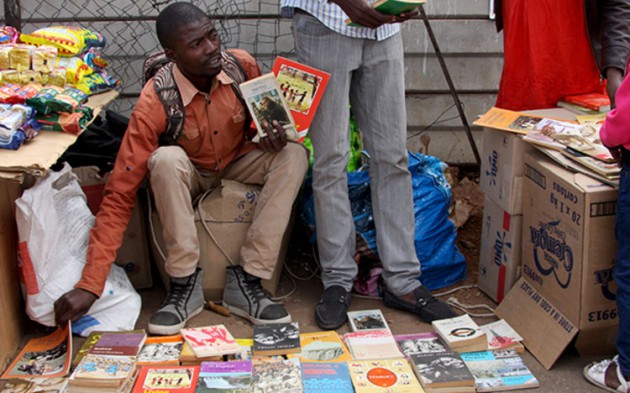Piracy: A blow to authors, publishers

Runyararo Muzavazi Features Writer
The illegal reproduction and photocopying of books, which are then sold on the streets, has given livelihoods for many but left authors and publishers wallowing in poverty. Education institutions are on record for spearheading the photocopying of books in the process suffocating the sector, intellectual property lobbyists say.
Most of schools, colleges and universities have since acquired heavy duty photocopying machines and this is killing the authors and stripping them of their revenue. Book piracy involves the replication of copyrighted literature through scanning, photocopying, printing and electronic duplication of books, which is now common in the major cities.
In light of the rampant piracy, stakeholders in the book industry have called for a review of penalties slapped on those found guilty of breaching copyright and intellectual property laws through engaging concerned ministries. One writer, Tinashe Mukucha, says book piracy is a double-barrelled attack threatening the continued existence of the conventional book value chain.
“Book piracy is killing our authors. Our writers are not receiving any financial benefit from the fruits of their creativity. Most live in squalor or die paupers, yet their words and ideas educate a nation. Every writer has a right to be paid for his book,” says Mukucha.
He added saying the advent of technology is ripping off the publishing industry as a whole.
“Unfortunately, we are still in the dinosaur era. Our publishers and the book pirates are yet to grasp the power of technology as a distributing mechanism for books. The mostly affected sector is the academic book sector, which remains lucrative and generates more revenue than consumer publishing. Textbook piracy has been on the rise, spurred on by the expense of course materials and the absence of bookshops. Some local publishers have given up because of justifiable resentment over the pirates,” he said.
On the other hand, cheap printing has somehow come to the rescue of publishers and self-publishing authors but it sometimes has led to reduced quality of new literature.
“Book piracy is an opportunity to revamp our local systems that support the book from production to distribution. We currently have no infrastructure to support the book — no active publishers, no bookshops in our cities, no writing organisations to support our young writers,” he said.

Schools, colleges and universities have acquired heavy duty photocopying machines and this is killing the authors and stripping them of their revenue
According to Mukucha, there is no doubt piracy will continue to plague Zimbabwe book publishers if law enforcement agents are not engaged.
“In the absence of action from stakeholders and law enforcement agents, the book industry will continue to suffer under the weight of piracy and in the process the country is losing revenue and could soon become the biggest importer of books,” he said.
One of Zimbabwe’s finest writers, Memory Chirere said writers came together to work on ways to stop piracy.
“Writers and publishers have come together through Zimbabwe International Book Fair and Zim-copy with an elaborate document which has clear pointers on what stakeholders and Government will do to deal with piracy. The voices of single authors have never taken us anywhere,” said Chirere.
Zimbabwean writer, storyteller, and musician, Ignatius Mabasa says it is disheartening that schools are spearheading book piracy after they had been given orders not to photocopy books.
“Schools were given directives not to photocopy books; it hurts to know that they are the ones at the forefront as they used to buy original books and not photocopies. We need legislation and political will that will curb theft of intellectual property as we are seeing books being sold in day light on sidewalks,” he said.
Mabasa feels book piracy may have been caused by economic hardships being experienced in the country.
“Economic hardships as well as lack of political will are triggering the mushrooming of book pirates. Zimbabweans nowadays, because of the economic situation, prefer piracy to earn a living. Moreover, because technologically we are lagging behind in terms of markets, we end up losing revenue,” he said.
Mabasa advised Government to act on book piracy the same way they did with money traders. A tour by The Herald around the central business district (CBD)showed that authors and publishers are battling for relevance in the face of a low reading culture. City sidewalks were covered with cheap quality editions significantly marked down from bookshop prices. Pirated copies usually cost less than half the original work. Veteran playwright Stephen Chifunyise earlier this year spoke strongly against piracy, calling it an economic crime which has been made to exist like a justified legal activity.
“There does seem to be a need for a new strategy that takes into consideration that this economic crime has become legitimate business and those involved in it justify their actions giving reasons the general public accept as a legitimate means of earning a living,” he said.
Chifunyise said copyright holders needed to build support from readers.
“The whole creative industry and the Government must be involved in the new strategy. On the part of the Government, he observed that political will is fundamental in thwarting piracy but only copyright holders can build and affect this political will if they talk with one voice,” he says.
Books have become cheaper for many Zimbabweans, yet publishers and writers are seeing their earnings evaporate due to mushrooming book piracy. Many parents say they have resorted to buying prescribed textbooks on the streets after failing to get them from bookshops. Harare resident Tarisai Karimanzira (33) said piracy was not unique in the country.
“It is sad that schools are encouraging violation of the copyright laws by purchasing heavy duty photocopying machines for reproduction of academic books as well as allowing students to photocopy books. Most of the times these pirates get away with it because much of the attention is given to music piracy while there is little to no focus on reduction of book piracy. Stakeholders need to know that the damage is the same as both lose revenue in the long run,” she said.
She also thinks corruption could be one of the causes for some schools to resort to photocopied books as they take the money and use it for personal gain instead of buying high quality books for pupils. Tafadzwa Mukaro, another resident, thinks parents should help in curbing book piracy.
“The inaccessibility of books does force parents to buy books from sidewalks and this results in increased involvement with pirates at the expense of publishers. On the other hand publishers need to price their books reasonably to avoid facilitating piracy.
He urged all writers to create a bond with their readers by offering incentives.
“Publishers have the power to offer special discounts to readers who legitimately purchase their books. These can be through an email newsletter and advertising these incentives in each copy of your book to turn people who consume pirated copies into legitimate readers of your work,” he said.
Primary and Secondary Education Minister Lazarus Dokora recently urged headmasters and those entrusted with buying school materials to work within the confines of copyright laws, adding that it was a shame that some of his officials were arraigned before the courts accused of violating copyright laws. Minister Dokora recalled having attended a court session in Marondera where a headmaster was being charged for violating the Copyright Act by photocopying an Ordinary Level set book.











Comments